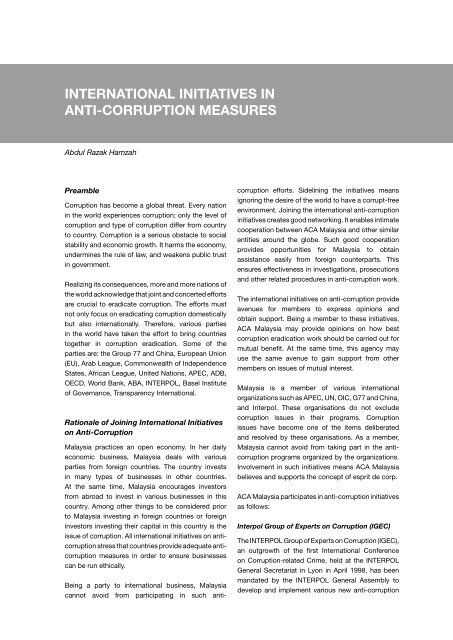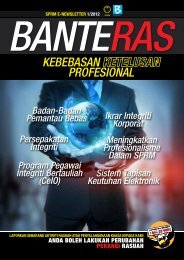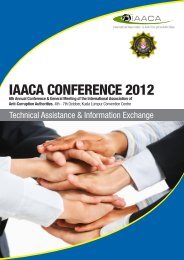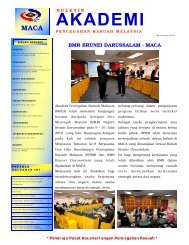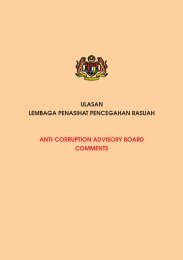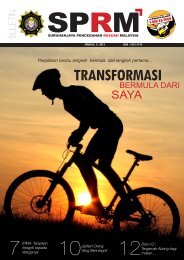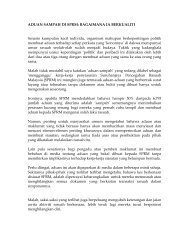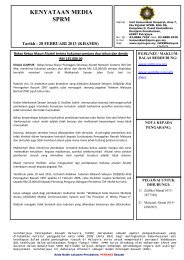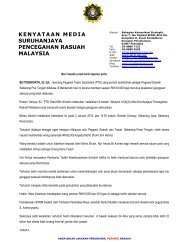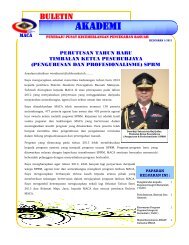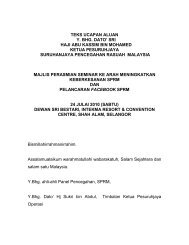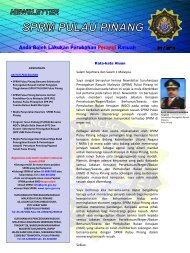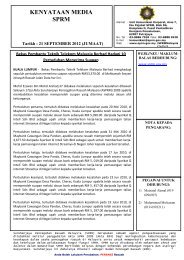International Initiatives In Anti-Corruption Measures
International Initiatives In Anti-Corruption Measures
International Initiatives In Anti-Corruption Measures
Create successful ePaper yourself
Turn your PDF publications into a flip-book with our unique Google optimized e-Paper software.
<strong><strong>In</strong>ternational</strong> initiatives in anti-corruption<br />
15<br />
<strong><strong>In</strong>ternational</strong> initiatives in<br />
anti-corruption measures<br />
Abdul Razak Hamzah<br />
Preamble<br />
<strong>Corruption</strong> has become a global threat. Every nation<br />
in the world experiences corruption; only the level of<br />
corruption and type of corruption differ from country<br />
to country. <strong>Corruption</strong> is a serious obstacle to social<br />
stability and economic growth. It harms the economy,<br />
undermines the rule of law, and weakens public trust<br />
in government.<br />
Realizing its consequences, more and more nations of<br />
the world acknowledge that joint and concerted efforts<br />
are crucial to eradicate corruption. The efforts must<br />
not only focus on eradicating corruption domestically<br />
but also internationally. Therefore, various parties<br />
in the world have taken the effort to bring countries<br />
together in corruption eradication. Some of the<br />
parties are: the Group 77 and China, European Union<br />
(EU), Arab League, Commonwealth of <strong>In</strong>dependence<br />
States, African League, United Nations, APEC, ADB,<br />
OECD, World Bank, ABA, INTERPOL, Basel <strong>In</strong>stitute<br />
of Governance, Transparency <strong><strong>In</strong>ternational</strong>.<br />
Rationale of Joining <strong><strong>In</strong>ternational</strong> <strong><strong>In</strong>itiatives</strong><br />
on <strong>Anti</strong>-<strong>Corruption</strong><br />
Malaysia practices an open economy. <strong>In</strong> her daily<br />
economic business, Malaysia deals with various<br />
parties from foreign countries. The country invests<br />
in many types of businesses in other countries.<br />
At the same time, Malaysia encourages investors<br />
from abroad to invest in various businesses in this<br />
country. Among other things to be considered prior<br />
to Malaysia investing in foreign countries or foreign<br />
investors investing their capital in this country is the<br />
issue of corruption. All international initiatives on anticorruption<br />
stress that countries provide adequate anticorruption<br />
measures in order to ensure businesses<br />
can be run ethically.<br />
Being a party to international business, Malaysia<br />
cannot avoid from participating in such anti-<br />
corruption efforts. Sidelining the initiatives means<br />
ignoring the desire of the world to have a corrupt-free<br />
environment. Joining the international anti-corruption<br />
initiatives creates good networking. It enables intimate<br />
cooperation between ACA Malaysia and other similar<br />
entities around the globe. Such good cooperation<br />
provides opportunities for Malaysia to obtain<br />
assistance easily from foreign counterparts. This<br />
ensures effectiveness in investigations, prosecutions<br />
and other related procedures in anti-corruption work.<br />
The international initiatives on anti-corruption provide<br />
avenues for members to express opinions and<br />
obtain support. Being a member to these initiatives,<br />
ACA Malaysia may provide opinions on how best<br />
corruption eradication work should be carried out for<br />
mutual benefit. At the same time, this agency may<br />
use the same avenue to gain support from other<br />
members on issues of mutual interest.<br />
Malaysia is a member of various international<br />
organizations such as APEC, UN, OIC, G77 and China,<br />
and <strong>In</strong>terpol. These organisations do not exclude<br />
corruption issues in their programs. <strong>Corruption</strong><br />
issues have become one of the items deliberated<br />
and resolved by these organisations. As a member,<br />
Malaysia cannot avoid from taking part in the anticorruption<br />
programs organized by the organizations.<br />
<strong>In</strong>volvement in such initiatives means ACA Malaysia<br />
believes and supports the concept of esprit de corp.<br />
ACA Malaysia participates in anti-corruption initiatives<br />
as follows:<br />
<strong>In</strong>terpol Group of Experts on <strong>Corruption</strong> (IGEC)<br />
The INTERPOL Group of Experts on <strong>Corruption</strong> (IGEC),<br />
an outgrowth of the first <strong><strong>In</strong>ternational</strong> Conference<br />
on <strong>Corruption</strong>-related Crime, held at the INTERPOL<br />
General Secretariat in Lyon in April 1998, has been<br />
mandated by the INTERPOL General Assembly to<br />
develop and implement various new anti-corruption
16<br />
Public Private Partnership in <strong>In</strong>tegrity Enhancement and <strong>Anti</strong>-<strong>Corruption</strong> <strong>Measures</strong><br />
initiatives to carry out law enforcement in the fight<br />
against corruption. The IGEC is a multi-disciplinary<br />
group representing all of INTERPOL’s regions. It<br />
facilitates the co-ordination and harmonisation<br />
of the different national and regional approaches<br />
to combating corruption. <strong>In</strong> addition, the group<br />
includes a host of other international stakeholders<br />
in the global anti-corruption campaign. The rationale<br />
underlying this structure is the general belief that<br />
law enforcement should combat corruption as a<br />
phenomenon holistically, in co-operation with all<br />
major players and the community at large. The IGEC<br />
is currently chaired by Mark Gough, Deputy Director,<br />
<strong>In</strong>vestigations Division, Office of <strong>In</strong>ternal Oversight<br />
Services at the United Nations, and comprises experts<br />
representing Austria, Australia, Canada, Egypt, Hong<br />
Kong (China), Malaysia, Mexico, Thailand, the United<br />
Kingdom and the United States, plus the European<br />
Commission, the <strong>In</strong>ter-American Development Bank,<br />
Transparency <strong><strong>In</strong>ternational</strong>, the University of Ottawa<br />
and the INTERPOL General Secretariat.<br />
The IGEC provides essential information and feedback<br />
to INTERPOL on matters pertaining to all aspects of<br />
corruption, and is mandated to advise the Secretary<br />
General on how best to combat this phenomenon,<br />
both operationally and strategically. To give effect to<br />
this mandate, the experts meet at least twice annually.<br />
The IGEC is present at all anti-corruption meetings<br />
and participates in most anti-corruption fora. It has<br />
also conducted numerous anti-corruption workshops<br />
and seminars and hosted several conferences. The<br />
group has established substantial credentials as being<br />
innovative and leading the fight against corruption<br />
globally. ACA Malaysia is represented by Abu Kassim<br />
bin Mohamed, as a member of the group since its<br />
inception.<br />
Asia Pacific Group on Money Laundering<br />
The Asia Pacific Group on Money Laundering (APG)<br />
is an autonomous and collaborative international<br />
organization founded in 1997 in Bangkok, Thailand,<br />
consisting of 38 member jurisdictions and a number<br />
of international and regional observers. Some of the<br />
international organizations who participate in, and<br />
support the efforts of the APG in the region include<br />
the FATF, <strong><strong>In</strong>ternational</strong> Monetary Fund, the World<br />
Bank, the United Nations Office on Drugs and Crime,<br />
the Asian Development Bank, the Egmont Group of<br />
Financial <strong>In</strong>telligence Units, and APEC. The member<br />
jurisdictions and observers of the APG are committed<br />
to the effective implementation and enforcement of<br />
internationally accepted standards against money<br />
laundering and the financing of terrorism, in particular<br />
through the Forty Recommendations and Nine<br />
Special Recommendations on Terrorist Financing of<br />
the Financial Action Task Force on Money Laundering<br />
(FATF).<br />
The APG has five key roles:<br />
1. To assess compliance by APG member<br />
jurisdictions with the global AML/CFT<br />
standards through a robust mutual evaluation<br />
program;<br />
2. To coordinate technical assistance and<br />
training with donor agencies and countries<br />
in the Asia/Pacific region in order to improve<br />
compliance by APG members with the global<br />
AML/CFT standards;<br />
3. To participate in, and co-operate with, the<br />
international anti-money laundering network -<br />
primarily with the FATF and with other regional<br />
anti-money laundering groups;<br />
4. To conduct research and analysis into money<br />
laundering and terrorist financing trends and<br />
methods to better inform APG members of<br />
systemic and other associated risks and<br />
vulnerabilities; and<br />
5. To contribute to the global policy development of<br />
anti-money laundering and counter terrorism<br />
financing standards by active Associate<br />
Membership status in the FATF.<br />
The APG also assists jurisdictions to establish<br />
coordinated domestic systems for reporting and<br />
investigating suspicious transaction reports and<br />
to develop effective capacities to investigate and<br />
prosecute money laundering and the financing<br />
of terrorism offences. Malaysia, through the<br />
establishment of National Coordinating Committee<br />
(NCC) in April 2000 and following the cabinet<br />
approval, joined the APG on 31 May 2000. ACA<br />
Malaysia is a member of NCC which comprises 13<br />
agencies headed by the Central Bank. ACA Malaysia<br />
participated in the drafting of the national anti-money<br />
laundering plan, AMLA 2001 and MACMA 2002. The<br />
ACA participated in the APG Mutual Evaluation on<br />
Malaysia in 2001, IMF/OGBS Mutual Evaluation on<br />
Labuan IOFC 2001 and the APG Mutual Evaluation<br />
on Malaysia 2007.
<strong><strong>In</strong>ternational</strong> initiatives in anti-corruption<br />
17<br />
ADB/OECD <strong>Anti</strong>-<strong>Corruption</strong> <strong>In</strong>itiative for Asia and<br />
the Pacific<br />
Governments in Asia-Pacific have resolved to<br />
cooperate in the fight against corruption as early as<br />
1999, when they launched the <strong>Anti</strong>-<strong>Corruption</strong> <strong>In</strong>itiative<br />
for Asia-Pacific under the joint leadership of the Asian<br />
Development Bank (ADB) and the Organisation for<br />
Economic Co-operation and Development (OECD).<br />
The <strong>Anti</strong>-<strong>Corruption</strong> Action Plan for Asia and the<br />
Pacific, developed in the framework of this <strong>In</strong>itiative,<br />
sets out the goals and standards for sustainable<br />
safeguards against corruption in the economic,<br />
political and social spheres of countries in the region.<br />
To date, 28 countries and economies from Asia<br />
and the Pacific have endorsed the Plan and have<br />
agreed on implementation mechanisms to achieve its<br />
standards.<br />
The <strong>Anti</strong>-<strong>Corruption</strong> Action Plan sets high anticorruption<br />
standards and brings about concrete<br />
changes in the region’s anti-corruption landscape.<br />
It encourages the establishment of effective and<br />
transparent systems for public service, strong antibribery<br />
action and promotion of integrity in business<br />
operations, and the support of active involvement of<br />
the civil society. Moreover, its implementation and<br />
review mechanisms support the objectives of the UN<br />
Convention against <strong>Corruption</strong> and the OECD <strong>Anti</strong>-<br />
Bribery Convention in Asia-Pacific. The mechanisms<br />
and outcome of this process have earned the<br />
<strong>In</strong>itiative recognition from governments, international<br />
and donor organizations, civil society and the private<br />
sector.<br />
Countries and economies of the Asian and Pacific<br />
region that have endorsed the <strong>Anti</strong>-<strong>Corruption</strong><br />
Action Plan and committed to its goals are: Australia;<br />
Bangladesh; Bhutan; Cambodia; People’s Republic of<br />
China; Cook Islands; Fiji Islands; Hong Kong, China;<br />
<strong>In</strong>dia; <strong>In</strong>donesia; Japan; Kazakhstan; Korea; Kyrgyz<br />
Republic; Macao, China; Malaysia; Mongolia; Nepal;<br />
Pakistan; Palau; Papua New Guinea; Philippines;<br />
Samoa; Singapore; Sri Lanka; Thailand; Vanuatu; and<br />
Vietnam.<br />
Malaysia hosted the 4th Steering Group Meeting<br />
and 4th Regional <strong>Anti</strong>-<strong>Corruption</strong> Conference, which<br />
were officiated by Dato’ Seri Abdullah bin Haji Ahmad<br />
Badawi on 3-5 December 2003. Membership of<br />
the <strong>In</strong>itiative was open to any economy within the<br />
Asia-Pacific region that: recognizes the need for<br />
action against corruption and the benefits of sharing<br />
knowledge and experience across borders; is actively<br />
taking steps to implement anti-corruption measures<br />
based on international standards; and commits<br />
to undertake reforms under the framework and<br />
standards of the Action Plan and to participate in the<br />
<strong>In</strong>itiative’s review mechanisms.<br />
The <strong>In</strong>itiative’s Steering Group, comprising<br />
representatives of the <strong>In</strong>itiative’s member<br />
governments, defines the <strong>In</strong>itiative’s priorities and<br />
activities to support the members’ efforts in anticorruption<br />
reform. The Advisory Group, which includes<br />
donors, civil society representatives, business<br />
organizations and other constituencies that support<br />
the <strong>In</strong>itiative, assists the Steering Group by providing<br />
technical advice and helps mobilize resources. A<br />
small Secretariat, run jointly by the ADB and OECD,<br />
supports the Steering Group.<br />
The Action Plan sets out an implementation<br />
mechanism that has brought about tangible progress<br />
towards establishing sustainable safeguards against<br />
corruption since its adoption in late 2001. The<br />
mechanism foresees three main ways to support<br />
members’ efforts to achieve the Action Plan’s high<br />
standards: fostering policy dialogue and measuring<br />
progress; providing analysis to support the policy<br />
dialogue; and capacity building to enable members<br />
to thoroughly implement the reforms. Strong<br />
partnerships between member countries and with<br />
relevant regional and international organizations<br />
underpin these mechanisms.<br />
United Nations Convention against <strong>Corruption</strong><br />
(UNCAC)<br />
The convention was adopted by the UN General<br />
Assembly via its resolution 58/4 on 31 October<br />
2003. It has been signed by 140 countries since 9<br />
December 2003. Malaysia signed it on that date.<br />
Malaysia signed the instrument of ratification on<br />
17 September 2008 and deposited it to UN on<br />
25 September 2008 during the 63rd UN General<br />
Assembly. The UNCAC ratification by Malaysia is<br />
a testimony of the government’s commitment in<br />
promoting and strengthening measures to combat<br />
corruption at domestic, regional and global level,<br />
in line with the national agenda to make ethics and<br />
integrity an integral part of the society’s norm and<br />
culture. It also reflects Malaysia’s intention to be a full<br />
convention member and be proactive in combatting<br />
corruption. The convention came into force on 14<br />
December 2005 after 30 states ratified it. All together,<br />
there are 71 articles contained in the convention.<br />
The main convention protocols of UNCAC cover<br />
areas of prevention of corruption, criminalisation of
18<br />
Public Private Partnership in <strong>In</strong>tegrity Enhancement and <strong>Anti</strong>-<strong>Corruption</strong> <strong>Measures</strong><br />
corrupt offenders, international cooperation on anticorruption<br />
and asset recovery.<br />
Conference of the State Parties to UNCAC was<br />
established pursuant to article 63 of the convention<br />
to improve the capacity of and cooperation among<br />
state parties to achieve objectives set forth in UNCAC<br />
and to promote and review its implementation.<br />
APEC <strong>Anti</strong>-<strong>Corruption</strong> and Transparency Experts<br />
Task Force (ACT)<br />
APEC Economic Leaders put fighting corruption on<br />
their agenda in 2003 in Bangkok. The decision was<br />
taken to set up a task force under Senior Officials<br />
to specifically steer APEC anti-corruption activities,<br />
and the ACT was established in 2005. Prior to the<br />
establishment of the ACT, ACA Malaysia played an<br />
important and active role in the APEC Meeting of <strong>Anti</strong>-<br />
<strong>Corruption</strong> Experts in September 2004 in Santiago,<br />
Chile, to formulate the APEC Course of Action on<br />
Fighting <strong>Corruption</strong> and Ensuring Transparency. ACA<br />
Malaysia has been a member to this meeting since<br />
then.<br />
Main focuses of the ACT are to: encourage members<br />
to take all appropriate steps towards ratification of,<br />
or accession to, and implementation of the UNCAC;<br />
strengthen measures to effectively prevent and fight<br />
corruption and ensure transparency; deny safe haven<br />
to officials and individuals guilty of public corruption;<br />
fight both public and private sector corruption; forge<br />
public-private partnership in fighting corruption<br />
and ensuring transparency; cooperate with APEC<br />
member economies to combat corruption and ensure<br />
transparency in the region.<br />
<strong><strong>In</strong>ternational</strong> Association of <strong>Anti</strong>-<strong>Corruption</strong><br />
Authorities (IAACA)<br />
The establishment of the <strong><strong>In</strong>ternational</strong> Association of<br />
<strong>Anti</strong>-<strong>Corruption</strong> Authorities (IAACA) was initiated at<br />
the High-Level Political Conference for the Purpose<br />
of Signing the United Nations Convention against<br />
<strong>Corruption</strong> (UNCAC) in Merida, Mexico in December<br />
2003. It has since received enthusiastic support<br />
among the various anti-corruption authorities in many<br />
countries and international organizations, as well as<br />
special assistance of the United Nations Office on<br />
Drugs and Crime (UNODC) at Vienna.<br />
<strong>In</strong> the informal consultations on the establishment<br />
of an international association of anti-corruption<br />
authorities at the UN Office in Vienna in April 2006,<br />
representatives from international organizations and<br />
anti-corruption authorities in Argentina, Azerbaijan,<br />
France, Germany, <strong>In</strong>dia, Japan, Korea, Latvia,<br />
Malaysia, Namibia, Netherlands, Pakistan, Romania,<br />
Singapore, South Africa, Uganda, United Kingdom<br />
and United States of America, as well as the leaders<br />
of the UNODC, gave their unanimous support to the<br />
establishment of the IAACA.<br />
ACA Malaysia has been one of the founding members<br />
of this association since 2005. The Director General<br />
of ACA Malaysia is a member of its Executive<br />
Committee. The First Annual Conference and General<br />
Meeting of IAACA were held in Beijing from 22nd to<br />
26th, October, 2006. About 1000 delegates from<br />
137 countries and 12 international organizations<br />
participated in the event. Among them, more than<br />
250 were officials of deputy minister level or above.<br />
The President of the People’s Republic of China,<br />
His Excellency Mr. Hu Jintao, attended the opening<br />
ceremony of the Conference and delivered a speech.<br />
A formal Declaration was passed at the closing<br />
ceremony of the Conference.<br />
IAACA aims at facilitating the implementation of<br />
UNCAC, consolidating international cooperation to<br />
combat corruption, promoting measures for prevention<br />
of corruption in both public and private sectors,<br />
and facilitating the exchange and dissemination of<br />
expertise and experience.<br />
Conclusion<br />
All initiatives that ACA Malaysia participates in carry<br />
the same mandate – to eradicate corruption, enhance<br />
integrity and ensure transparency. The work towards<br />
these aims requires all nations to form a specific<br />
entity. These initiatives encourage cooperation among<br />
members, sharing best practices and information to<br />
criminalise all forms of corruption. Being a member<br />
to these initiatives provides ACA Malaysia numerous<br />
advantages in its daily operations. These advantages<br />
enable the agency to improve its effectiveness and<br />
efficiency.<br />
NOTE : This article was published in ‘The Enhancement of <strong>In</strong>tegrity and <strong>Anti</strong>-<strong>Corruption</strong><br />
<strong>Measures</strong>’ by Private Sector Division, Malaysian <strong>In</strong>stitute of <strong>In</strong>tegrity.


